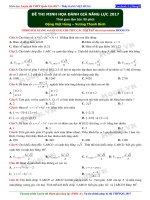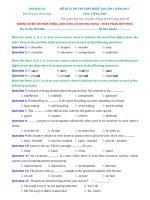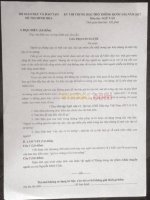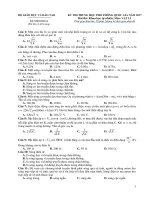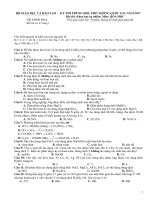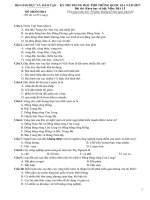- Trang chủ >>
- THPT Quốc Gia >>
- Ngoại Ngữ
DE THI MINH HOA 2017
Bạn đang xem bản rút gọn của tài liệu. Xem và tải ngay bản đầy đủ của tài liệu tại đây (508.58 KB, 5 trang )
HOCMAI.VN
ĐỀ KTCL ÔN THI THPT QUỐC GIA LẦN 1 NĂM 2017
(Đề thi gồm: 06 trang)
Môn: TIẾNG ANH
Thời gian làm bài: 60 phút, không kể thời gian phát đề
NHÓM LUYỆN THI MÔN TIẾNG ANH CÙNG CÔ HƯƠNG FIONA –THẦY PHAN HUY PHÚC
Họ và tên thí sinh: ……………………………………………..…………….. Số báo danh: ……………..
Mark the letter A, B, C, or D on your answer sheet to indicate the word that differs from the
other three in the position of the primary stress in each of the following questions.
Question 1: A. describe
B. chapter
C. wonder
Question 2: A. consider
B. volunteer C. comprehend
D. easy
D. entertain
Mark the letter A, B, C, or D on your answer sheet to indicate the word whose underlined part
differs from the other three in pronunciation in each of the following questions.
Question 3: A. same
B. taste
C. swallow
D. page
Question 4: A. played
B. proved
C. opened
D. regarded
Mark the letter A, B, C, or D on your answer sheet to indicate the correct answer to each of the
following question
Question 5: Instead of being excited about the good news, Ted seemed to be____________.
A. indifferent
B. unlikely
Question 6: Windsurfing or_____
A. boat-sailing
Question 7: The___
A. player
C. unexpected
D. ignorant
is the sport of sailing on water standing on a board.
B. sail-boarding
C. wind-sailing
D. board-sailing
__ is the official who controls the game in some sports.
B. captain
C. referee
D. defender
Question 8: _______ people to work together effectively, they need to be sensitive to each other’s
needs.
A. In order for
B. So that
C. In order that
D. In order to
Question 9: His brother refuses to even listen to anyone else's point of view. He is very_________.
A. kind - hearted
B. narrow- minded C. open - minded
D. absent - minded
Question 10: Jump in the car. There’s enough__________ for you.
A. chair
B. place
C. room
D. space
Question 11: An economic__________ is a time when there is very little economic activity, which
causes a lot of unemployment and poverty.
A. improvement
B. depression
C. development
D. mission
Question 12: The doctor who is__________ tonight in the general hospital is Mr. Brown.
A. on call
B. on work
C. on tour
D. on turn
Question 13: “Would you mind turning down your stereo?’’ - “______________”
A. I’m really sorry! I ‘m not paying attention
B. Yes, I do
C. Oh! I’m sorry! I didn’t realize that
D. No. I don’t
Question 14: RAILWAY NOTICE: Passengers___________ walk on the line
A. mustn’t
B. needn’t
C. need
D. must
Question 15: Conservationists____________ that experiments on animals be stopped.
A. banned
B. complained
C. said
D. recommended
Read the following passage and mark the letter A, B, C, or D on your answer sheet to choose
the word or phrase that best fits each of the numbered blanks..
Health is something we tend to (16)________ when we have it. When our body is doing well,
we are hardly (17)________ of it. But illness can come, even (18)________ we are young. In fact,
childhood has been a very susceptible time. Many diseases attack children in particular, and
people know very little (19)________ to cure them once they struck. The result was that many
children died. About a century ago, (20)________, scientists found out about germs, and then
everything changed. The (21)________ of many diseases was found, and cures were developed. As
this medical discovery spread, the world became (22)________ safer for children. The result is that
(23)________ a hundred years ago, the average man lived for 35 years, nowadays, in many areas of
the world, people can (24)________ to live for 75 years. And what do we expect by the year 2020?
Undoubtedly, medical science will continue to (25)________. Some people will be able to avoid
medical problems that are unavoidable today.
Question 16: A. ignore
B. forget
C. throw away
D. give up
Question 17: A. awake
B. concerned
C. keen
D. aware
Question 18: A. if
B. when
C. so
D. while
Question 19: A. what
B. which
C. when
D. how
Question 20: A. although
B. however
C. moreover
D. therefore
Question 21: A. origin
B. reason
C. source
D. cause
Question 22: A. much
B. very
C. more
D. quite
Question 23: A. where
B. why
C. when
D. whereas
Question 24: A. desire
B. want
C. expect
D. hope
Question 25: A. advance
B. speed up
C. accelerate
D. run
Mark the letter A, B, C, or D on your answer sheet to indicate the word(s) CLOSEST in meaning
to the underlined word(s) in each of the following questions.
Question 26: When being interviewed, you should concentrate on what the interviewer is saying
or asking you.
A. pay all attention to B. be related to
C. be interested in
D. express interest to
Question 27: The medical community continues to make progress in the fight against cancer.
A. speed
B. expectation
C. improvement
D. treatment
Mark the letter A, B, C, or D on your answer sheet to indicate the word OPPOSITE in meaning
to the underlined word(s) in each of the following questions.
Question 28: You would look ridiculous in such a tiny dress.
A. smart
B. silly
C. humorous
D. fun
Question 29: Adding a garage will enhance the value of the house.
A. stabilize
B. alter
C. diminish
D. increase
Mark the letter A, B, C, or D to indicate the underlined part that needs correction
Question 30: The boy has returned the wallet back to its original owner right after he picked it
up.
A. returned the wallet back
B. its
C. picked it up
D. original
Question 31: The people in Europe are now using the common unit of money called Euro,
although the economies in those countries are not exact the same.
A. called
B. exact
C. are now using
D. although
Read the following passage and mark the letter A, B, C, or D on your answer sheet to indicate
the correct answer to each of the following questions.
Long ago prehistoric man began to domesticate a number of wild plants and animals for
his own use. This not only provided more abundant food but also allowed more people to live on a
smaller plot of ground. We tend to forget that all of our present-day pets, livestock, and food
plants were taken from the wild and developed into the forms we know today.
As centuries passed and human cultures evolved and blossomed, humans began to
organise their knowledge of nature into the broad field of natural history. One aspect of early
natural history concerned the use of plants for drugs and medicine. The early herbalists
sometimes overworked their imaginations in this respect. For example, it was widely believed
that a plant or part of a plant that resembles an internal organ would cure ailments of that organ,
Thus, an extract made from a heart-shaped leaf might be prescribed for a person suffering from
heart problems.
Nevertheless, the overall contributions of these early observers provided the rudiments of
our present knowledge of drugs and their uses.
Question 32: What does this passage mainly discuss?
A. Cures from plants.
B. Prehistoric man.
C. Early plants and animals.
D. The beginning of natural history.
Question 33: Domestication of plants and animals probably occurred because of___________.
A. the desire of prehistoric man to be nomadic
B. early mans power as a hunter
C. need for more readily available food
D. lack of wild animals and plants
Question 34: The word “extract” is closest in meaning to___________.
A. flavour
B. design
C. ailment
D. substance
Question 35: Which of the following can be inferred from the passage?
A. The work of early herbalists has nothing to do with present day medicine.
B. There is little relation between a cure for illness and the physical shape of a plant.
C. Early herbalists were unimaginative.
D. The shape of a plant is indicative of its ability to cure ailments of a similarly shaped
organ.
Mark the letter A, B, C, or D on your answer sheet to indicate the sentence that is closest in
meaning to the sentence given in each of the following questions.
Question 36: Too tired to continue, David stopped walking.
A. David can’t continue to walk when he’ stirred.
B. David couldn’t carry on walking because he was too tired.
C. David was too tired to carry out walking.
D. David couldn’t stop walking because he was to tired.
Question 37: It seems that no one predicted the correct answer.
A. No one seems to predict the answer correctly.
B. No one seems to have a correct prediction about the answer.
C. It‘s apparent that the answer isn’t correctly predicted.
D. No one seems to have predicted the correct answer.
Mark the letter A, B, C, or D on your answer sheet to indicate the sentence that best joins each
of the following pairs of sentences in each of the following questions.
Question 38: We arrived at the conference. We realized our reports were still at home.
A. We arrived at the conference and realized that our reports are still at home.
B. It was until we arrived at the conference that we realize our reports were still at home.
C. Not until we arrived at the conference, did we realize that our reports were still at home
D. Not until had we arrived at the conference, we realized our reports were still at home.
Question 39: I should have studied last night. However, I was too tired.
A. I couldn't study last night because I was very tired.
B. I studied last night because I was bored.
C. I studied last night because I had to.
D. I tried to study last night, but the homework was too hard.
Question 40: It doesn’t make any difference if it rain. They will still go.
A. The difference is their going in the rain. B. Whether it rains or not, they will still go.
C. But for the rain, they would have gone. D. But for the rain, we would not have gone.

